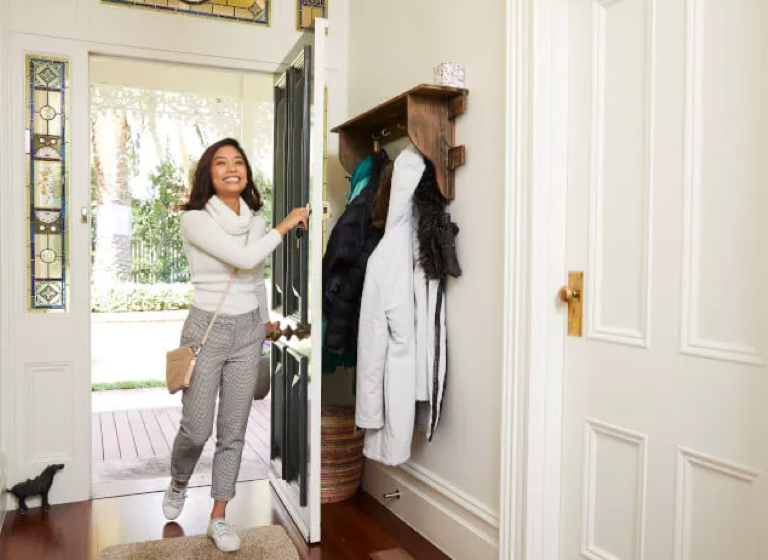How Home Security Keeps You Safe
How Home Security Keeps You Safe
*iSelect does not compare to all home and contents insurers in the market. The availability of policies may change from time to time. Not all policies made available from iSelect’s providers are compared by iSelect and due to commercial arrangements, area or availability, not all policies compared by iSelect will be available to all customers. See below for our range of home and contents insurers. Some policies are only available from iSelect’s call centre or online. Our advice on this website is of general nature and does not consider your situation or needs. Consider if any advice is appropriate for you before acting on it. Learn more.
Compare home and contents insurance the easy way*
Save time and effort by comparing a range of home and contents insurance policies with iSelect
How does a home security system work?
How does home security protect you from theft?
What items typically get stolen in a home burglary?
Can home security systems help with emergencies?
How much do home security systems cost?
Wait, can home security systems save me money?
Where can I find and compare Home and Contents Insurance?
Ideally, your home should be a secure, cozy, and comfy refuge from the troubles of the outside world. Financially protecting that home from fire, earthquakes and floods with Home and Contents Insurance is a pretty common thing for Aussies to do.
Theft can also be covered with insurance but prevention is always better than a cure, so home security systems are the next logical step. Not only can they prevent break-ins but some are able to alert the authorities and might even keep your insurance premiums down.
How does a home security system work?
A home security system is exactly that: a system. It involves a lot of different devices that work together. They each cover different functions: some look for intruders, some provide warnings and some make breaking into your home more difficult.
While differences between systems exist, your ‘typical’ system will usually incorporate things like:
- Security Cameras (CCTV or Ring Cameras)
- Door and Window Locks
- Alarms
- Smart lights
- Motion Detectors
- Window Stickers
Modern systems are usually connected via Wi-Fi, which lets homeowners control and monitor their system through smart phone apps. This means that you can keep an eye on your home even when you’re away on holiday. Remote monitoring at its finest!
How does home security protect you from theft?
You might already have a big guard dog or keep your valuables under the floorboards but home security systems go one step further. In fact, thieves will have a much harder time stealing your stuff for a few key reasons:
- It provides early detection
Motion sensors will pick up on unfamiliar footsteps and set alarms blaring. Not only is this a good way to scare off would-be thieves, but it will alert the entire neighbourhood! Plus, it means that you can respond immediately—which means a better chance of preventing theft or property damage. - It makes breaking in harder
Deadlocks on the doors and protective window films can make breaking into your home a lot more time-consuming. These extra minutes might be invaluable when it comes to calling the authorities. In some cases, it might prevent burglars from gaining access altogether. - Quick emergency response
A ‘monitored’ security alarm (also known as back-to-base alarms) will jump into action before you even need to call the police. In most cases, a security patrol or police car will be dispatched to your home once the alarm is triggered. They might even catch the burglar in the act.
Of course, there’s other ways that these systems can help you if someone breaks into your home or damages your property.
For one, the footage caught on your security camera might come in handy as evidence if the thief scampers off before the police get to the scene. It will also be useful when you make a claim with your insurer and need to provide some kind of proof the burglary took place.
What items typically get stolen in a home burglary?
Now, before you set up a brand new security system, you might be wondering what thieves actually try to steal during a home invasion. Maybe you even bought a safe where you can keep your valuable possessions locked up!
Fortunately, the data is pretty clear here. The most recent report on Crime Victimisation by the Australian Bureau of Statistics1Australian Bureau of Statistics – Crime Victimisation, Australia | 2021-22 financial year provides a decent break-down on which items burglars stole during 2021-2022:
| Stolen Property | Prevalence |
| Personal items, like jewellery and clothing | 22% |
| Tools | 15% |
| Money, purse or wallet | 14% |
| Bicycles or sporting equipment | 14% |
Surprisingly, money didn’t top the list here! It’s possibly because most people keep cash on their person—or maybe they’ve moved to card-only payments.
Whatever the reason, it’s pretty clear that burglars prefer expensive items to cash.
That’s why it’s a good idea to keep your valuables out-of-sight. Police have done the research and say that burglars will usually look for jewellery boxes, bedroom dressers, bedside drawers and cupboards.2ACT Policing – Home Security Keeping your precious items somewhere more discrete might just stop them from getting snatched.
Can home security systems help with emergencies?
Home security systems aren’t just for things that go bump in the night. They can also be a great asset when it comes to emergencies, especially when it comes to the following:
- Fires
Some ‘smart’ fire alarms—alarms that can connect wirelessly to the internet—can also be linked with your home security system. This allows them to alert you of any fires via mobile app, even if you’re away from home. - Child safety
Parents can rest easy with home security systems. They can use CCTV cameras to keep an eye on their young kids when they’re playing in the backyard or home alone. That way, you can rush into action if it looks like they’re about to hurt themselves. - Medical emergencies
For those living with elderly relatives or people with certain health conditions, CCTV cameras can also help you check in on them while you’re away. That way, if there’s a sudden fall or health issue, you can quickly call for medical help.
It’s also worth noting that just because you have a home security system doesn’t mean you should neglect other measures. For example, a handheld personal alarm allows people with serious conditions to alert their loved ones or monitoring services in the midst of an emergency.
How much do home security systems cost?
Home security systems generally cost between $500 to $2,000—although this can be much more if the setup is particularly extensive.
The type of installation required can also affect the cost. Wireless cameras and alarm systems often feature easy, do-it-yourself installation. By contrast, systems that need to be integrated into your home’s existing wiring may require professional installation. This will (obviously) cost more than the alternative.
It’s also important to consider any monthly fees that come with the security system. Monitoring fees are common here; the security company charges these fees to monitor your alarm and dispatch emergency services if someone sets it off. That aside, you could also start saving money in the long run when it comes to security systems.
Wait, can home security systems save me money?
The financial benefits of a home security system can extend further than simply protecting your property. It might just save you a bit of extra cash. Here’s how:
- Cheaper premiums
Insurers might look at a home with a schmick home security setup as less of a risk to insure. As a result, it could bring down the premiums when you take out Home and Contents Insurance. - Energy efficiency
Some home security systems can be integrated with smart home technology. This allows them to communicate with lighting controls and smart thermostats remotely, which means that you can adjust them—even when you’re outside the house—to save energy. - Property appeal
If you ever end up selling your home then a nice security system could make it even more attractive to prospective buyers. This is doubly true for those who want a cosy home where they know their family will be safe.
Where can I find and compare Home and Contents Insurance?
Although a home security system can offer a lot of protection, Home and Contents Insurance provides an additional safety net. And this just isn’t against theft—fires, storms and malicious damage can also receive coverage.
And, if you’re looking for a policy that suits, then iSelect can help. You can compare policies from a range of different providers* using our online comparison tool. In just a few seconds you could find your dream policy, so give it a whirl today!

.svg)






